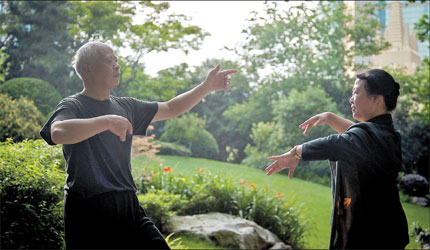
 |
| Two old people do morning exercise at a park in Jing'an District.(Photo/Shanghai Daily) |
Dai Jinxi, 81, lives alone in a 30-square-meter apartment in Hongkou District. He visits parks, plays chess, chats with old friends and watches television to ease the pangs of loneliness.
Dai's wife has a mental disorder and is confined to a local care center. Their only daughter is married and living in the US. One son works in the inland province of Jiangxi, and another son, who lives in Shanghai, is estranged from his father after financial disputes. "If I said I don't feel lonely, it would be a lie," Dai said. "But reality makes it impossible to change the situation."
Dai, who suffers from cataracts, has an ayi, a housekeeper who takes care of daily domestic chores. He refuses to move to a home for the aged because he said such places make old people feel abandoned.
Dai is not alone in China, a country with a rapidly aging population. Many old people, cut off from their children for one reason or another, suffer loneliness and even depression.
Enter the government. The National People's Congress amended the Law on Protection of Rights and Interests of the Aged to make it illegal to neglect the "spiritual needs" of the elderly. A clause in the amendment, which came into effect on July 1, stipulates that children have to visit elderly parents regularly or at least keep in touch with them in some way. Those who don't comply may face prosecution.
Forced visits 'meaningless'
It is no surprise that the new law is stirring up a lot of public comment, much of it critical.
"I don't want forced visits from my sons and daughters," Dai said. "That would be meaningless. They should act from their own accord."
Ambiguities in the law and the difficulty of enforcement have dominated discussion about the new rule.
"It is still unclear in the law how often people should visit," said Xu Zhenhua, a Shanghai lawyer. "Also, there is no clarification of the punishment for people who break this clause of the law."
The controversy underscores a dramatic shift in Chinese culture. In the past, the elderly were venerated. Filial piety was a deeply rooted ancient virtue. Most parents lived with their children until death.
The old system has broken down gradually. The one-child policy drastically reduced the number of children available to care for their elders. In the new demographics, the proportion of old people expanded. The rise of urbanization created a mass migrant class, separating children and parents. The rise of the market economy meant both husband and wife often have to work to make ends meet. Somehow or another, in the modernization of China, Granny has fallen between the cracks.
By 2015, Shanghai is expected to have 4.3 million people aged 60 or above, with about 700,000 of them older than 80.
The government is trying to build more nursing homes to care for elderly without children close at hand, but the need far outweighs current bed numbers. Still, a bricks-and-mortar approach to an aging population doesn't address the moral problem of families who neglect their parents.
Xu Yi, deputy director of the Yixian Nursing Home in Changning District, which accommodates about 300 seniors, said up to 40 percent of the elderly at the home have few visits from sons and daughters. Some children live abroad, some have become estranged from parents and some are just too busy - or at least say they are.
"Compulsory means the law cannot work well because it is a moral question and people should visit or greet their parents based on their own will," Xu said. "We can take care of the elderly physically, but we cannot replace their sons and daughters. No government or social organization can do that."

















 First panda born in Taiwan is female | Photos
First panda born in Taiwan is female | Photos


![]()
